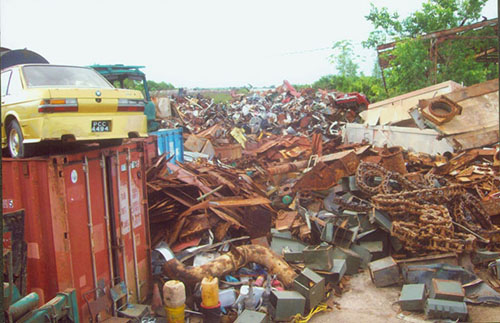Chastened by the controversy that has dogged the local scrap metal industry for several years, not least the vandalising of costly metal-based infrastructure owned and operated by local utility companies, the Ministry of Business has now re-opened the trade under more restrictive conditions. These include new rules to afford the Minister the prerogative of closing the trade again should operational glitches that compromise its integrity arise in the future.
Having been presented with evidence that metal thieves had been using the scrap metal trade as a means of covering their tracks, government had been forced to intervene under pressure from the victims of metals theft, particularly the Guyana Telephone and Telegraph Company (GTT). The company at one point, had been forced to endure frequent raids on its largely unprotected installations by purloiners seeking out copper, one of the most lucrative metals on the international market. That head of the Ministry’s Scrap Metal Unit, Ian Smith, was able to tell Stabroek Business on Monday that it had not received any report of copper theft from GTT for more than nine months is, the Ministry feels, as good a yardstick as any for determining the effectiveness of its own push back against the metal thieves.
Stabroek Business has also seen a draft of new legislation which, apart from affording a threatened industry the opportunity to continue to do business, will impose restrictive conditions that includes new rules and also create strict criteria for the collection and disposal of scrap metal.
Perhaps of equal significance, is the fact that the Ministry’s Scrap Metal Unit, which has been given full administrative responsibility for the trade, is now engaging metal dealers on a bilateral basis. This after cutting ties with an Association which has long been viewed as part of the problem rather than part of any long-term solution.
Smith told Stabroek Business earlier this week that the sector has now been re-opened for the trading of both ferrous and non-ferrous metals with overseas businesses, albeit under conditions designed to afford honest dealers the opportunity to ply their trade without undue hindrance whilst seeking to close the door on practices that were damaging not only to the trade itself but to important local utility companies.
Smith said that despite that the metal trade had been reopened since mid – 2018, the prospects for the long-term and uninterrupted trading in scrap metal depended on whether or not the players in the industry were prepared to comply with the rules.
The new regulations aim to target vandalism, theft and other unsavoury practices that are designed to circumvent rules which are in place to create and maintain a sense of order in the industry as well as restore the sense of institutional control which government appeared to have lost several years ago.
The existing draft Scrap Metal Bill, when it is eventually passed into law will draw a line under long-existing irregularities, though many of the provisions outlined in the draft Bill are seemingly being already applied under the new, more restrictive rules. Those rules, apart from reinforcing the regulations regarding the acquisition of a licence for the export of scrap metal also speak to the haphazard acquisition of “un-owned” scrap metal, transportation of scrap metal, utilising compaction equipment, importing compaction equipment, transformation of scrap metal and trading in or transforming copper. The new regulations also require dealers to apply annually for a Dealer’s licence, and carry on trade only “in approved yards.” Dealers must also erect and prominently display their trading signs as well as give notice of the change of business address.
Meanwhile, separate authorisations must be secured from the Ministry’s Scrap Metal Unit to trade either as a collector or an exporter. Both Motor Salvage Operators and other “Metal Users” must also secure authorisation to trade in scrap metal.
Further, the new rules preclude dealers from selling, purchasing, exporting or having in their possession “copper or aluminium that is melted, burned or otherwise transformed from its functional form” unless with the specific authorisation of the Ministry’s Scrap Metal Unit.
Smith explained that as a further means of responding to the irregularities in the system, individual scrap metal dealers who possessed valid business registrations and who were otherwise compliant under the regulations were being issued with three-monthly export licences. He said that that the new conditions under which the trade operates affords the Minister of Business the prerogative of tri-monthly interventions to monitor the progress of the trade and where necessary, to suspend trading in order to correct such anomalies as may arise.
“For all practical purposes the trade is now open at least until April 30th,” Smith told Stabroek Business. “Beyond that, it will remain open for as long as it is determined that the regulations are being adhered to.”
The idea behind the creation of the three-month windows, according to Smith, is to allow dealers who had stored metal to export even though it had been discovered that some dealers had actually been re-stocking with additional metals during that period despite agreement that no unmonitored re-stocking would take place during that period.
The local scrap metal industry has come under incremental pressure over several years arising out of the widespread metal theft and other irregularities that had pervaded the industry and on Monday Smith’s focus was on pointing to what he felt was the considerable ground which government had covered in restoring a semblance of normalcy to the trade.
Government had been triggered into taking action particularly on account of the targeting of the GTT installations. On Monday Smith told Stabroek Business that the Ministry had not received a complaint from GTT “for the past nine months,” a pronouncement clearly designed to send a message that the Ministry’s efforts to clean up the trade was gaining notable traction.






